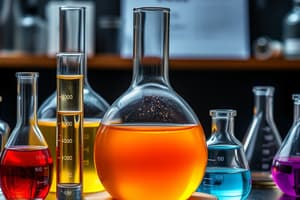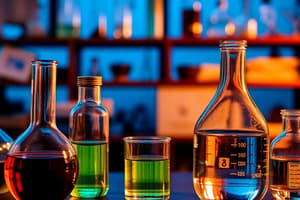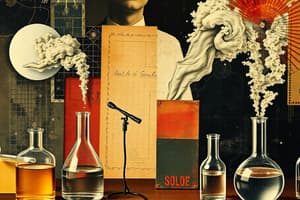Podcast
Questions and Answers
What is the first step of the Scientific Method?
What is the first step of the Scientific Method?
- Hypothesis
- Experiment
- Observation (correct)
- Prediction
A hypothesis must be formed after conducting an experiment.
A hypothesis must be formed after conducting an experiment.
False (B)
What key words are commonly used when writing a prediction?
What key words are commonly used when writing a prediction?
IF and THEN
The results of the experiment are referred to as _____?
The results of the experiment are referred to as _____?
Match the steps of the Scientific Method with their definitions:
Match the steps of the Scientific Method with their definitions:
Which of the following best describes a 'Fair Test'?
Which of the following best describes a 'Fair Test'?
Anyone can use the Scientific Method, not just scientists.
Anyone can use the Scientific Method, not just scientists.
What is needed before conducting an experiment?
What is needed before conducting an experiment?
Which variable is affected by changes in the independent variable?
Which variable is affected by changes in the independent variable?
In a fair test, multiple independent variables can be changed at the same time.
In a fair test, multiple independent variables can be changed at the same time.
What is the purpose of conducting trials in an experiment?
What is the purpose of conducting trials in an experiment?
The amount of water in a plant growth experiment is the __________ variable.
The amount of water in a plant growth experiment is the __________ variable.
Match the following pairs to identify the correct scientific terms:
Match the following pairs to identify the correct scientific terms:
Which of the following is NOT considered a control variable in an experiment?
Which of the following is NOT considered a control variable in an experiment?
The results from repeated trials are used to form a conclusion about the hypothesis.
The results from repeated trials are used to form a conclusion about the hypothesis.
What defines a fair test in scientific experiments?
What defines a fair test in scientific experiments?
What is the main purpose of a hypothesis in the scientific method?
What is the main purpose of a hypothesis in the scientific method?
A fair test in an experiment means that all variables are allowed to change.
A fair test in an experiment means that all variables are allowed to change.
What happens if the results of an experiment do not match the initial hypothesis?
What happens if the results of an experiment do not match the initial hypothesis?
The variable that is changed by the experimenter to test its effects is called the __________ variable.
The variable that is changed by the experimenter to test its effects is called the __________ variable.
Match the following types of variables with their definitions:
Match the following types of variables with their definitions:
The dependent variable is the one that remains constant throughout the experiment.
The dependent variable is the one that remains constant throughout the experiment.
What is an example of a fair test in an experiment?
What is an example of a fair test in an experiment?
What is the main purpose of the experiment described?
What is the main purpose of the experiment described?
If too much salt is added to the water, the egg will float only partially.
If too much salt is added to the water, the egg will float only partially.
What is the term for the information collected from the experiment?
What is the term for the information collected from the experiment?
A[n] ______ is an idea or explanation that you test in an experiment.
A[n] ______ is an idea or explanation that you test in an experiment.
Match the following vocabulary terms with their definitions:
Match the following vocabulary terms with their definitions:
Which variable is primarily altered to investigate the buoyancy of the egg?
Which variable is primarily altered to investigate the buoyancy of the egg?
Analysis occurs after collecting data and is essential to draw conclusions.
Analysis occurs after collecting data and is essential to draw conclusions.
When a hypothesis has been tested many times and the evidence supports it, it may lead to a[n] ______.
When a hypothesis has been tested many times and the evidence supports it, it may lead to a[n] ______.
Flashcards
Scientific Method
Scientific Method
A step-by-step process used to solve problems and understand the world.
Observation
Observation
Identifying a problem or something needing a solution; asking a testable question.
Hypothesis
Hypothesis
A possible answer to a question or an idea about what the answer might be.
Prediction
Prediction
Signup and view all the flashcards
Experiment
Experiment
Signup and view all the flashcards
Data
Data
Signup and view all the flashcards
Fair Test
Fair Test
Signup and view all the flashcards
Testable Question
Testable Question
Signup and view all the flashcards
Independent Variable
Independent Variable
Signup and view all the flashcards
Dependent Variable
Dependent Variable
Signup and view all the flashcards
Control Variable
Control Variable
Signup and view all the flashcards
Trials
Trials
Signup and view all the flashcards
Density
Density
Signup and view all the flashcards
Variables
Variables
Signup and view all the flashcards
Study Notes
Scientific Method
- The scientific method is a step-by-step process for solving problems and understanding the world.
- It involves observation, forming a hypothesis, making predictions, conducting experiments, and analyzing data.
- The scientific method can be used by anyone, not just scientists.
Steps of the Scientific Method
- Observation: Identifying a problem or something needing a solution, asking questions that can be answered by experiments. Use the 5 senses.
- Hypothesis: A possible answer or idea about what the solution might be; always come up with a hypothesis before conducting an experiment. The scientist needs to know what they are testing.
- Prediction: A statement of what will happen in the experiment if the hypothesis is correct; often uses "if...then" statements.
- Experiment: Physically performing a task to test the prediction; data is produced from the experiment.
- Data: The results of the experiment. The data is compared to the prediction and hypothesis to determine the experiment’s conclusion. Data (results) is gathered to determine the conclusion and prove if the hypothesis is correct.
Scientific Method in Action Example
- Example of the scientific method in everyday life - a power outage in HCMC.
- Observation: No power, the lights are off.
- Hypothesis: Replacing the flashlight's battery will restore power.
- Prediction: If the battery is changed, then the flashlight will turn on.
- Experiment: Replace the flashlight battery.
- Data: The flashlight turns on (or not).
Fair Test
- A fair test is an experiment that only changes one variable, and all other variables are kept the same.
Variables
- Independent variable: The variable that is purposely changed by the experimenter.
- Dependent variable: The variable that may change as a result of the changes made to the independent variable; dependent on the other variable.
- Control variables: The variables that are kept the same to ensure that the experiment tests only the independent variable; these are unchanged and constant.
Trials
- Trials are when a scientist repeats experiments to validate the hypothesis through multiple trials; repeated experiments validate the accuracy of the data. A hypothesis becomes a theory when trials support the hypothesis.
Vocabulary
- Observation: Information collected from the world, using the senses.
- Hypothesis: A proposed explanation for testing via experiments.
- Prediction: The expected outcome of an experiment if the hypothesis is true.
- Experiment: A test using observations and controlled variables.
- Data: Information collected during an experiment.
- Analysis: Interpreting collected data to draw conclusions.
- Theory: A well-substantiated explanation of some aspect of the natural world that is acquired through repeated observation and experimentation and is supported by a substantial body of evidence.
Next Week's Topic
- Atoms and elements in chemistry.
Studying That Suits You
Use AI to generate personalized quizzes and flashcards to suit your learning preferences.




